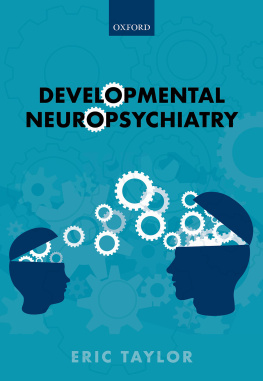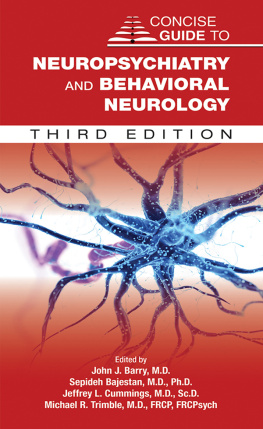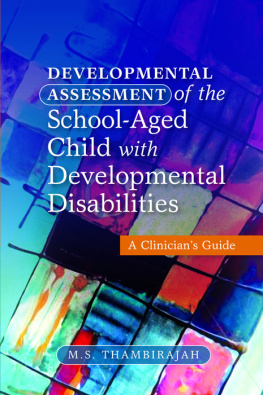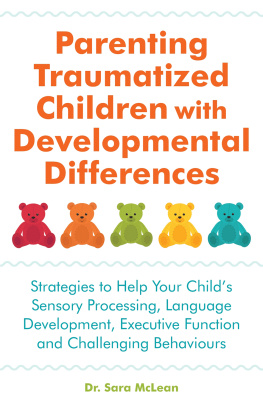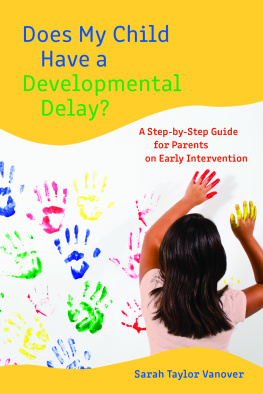Developmental Neuropsychiatry

Great Clarendon Street, Oxford, OX2 6DP,
United Kingdom
Oxford University Press is a department of the University of Oxford. It furthers the Universitys objective of excellence in research, scholarship, and education by publishing worldwide. Oxford is a registered trade mark of Oxford University Press in the UK and in certain other countries
Oxford University Press 2021
The moral rights of the author have been asserted
First Edition published in 2021
Impression: 1
All rights reserved. No part of this publication may be reproduced, stored in a retrieval system, or transmitted, in any form or by any means, without the prior permission in writing of Oxford University Press, or as expressly permitted by law, by licence or under terms agreed with the appropriate reprographics rights organization. Enquiries concerning reproduction outside the scope of the above should be sent to the Rights Department, Oxford University Press, at the address above
You must not circulate this work in any other form and you must impose this same condition on any acquirer
Published in the United States of America by Oxford University Press
198 Madison Avenue, New York, NY 10016, United States of America
British Library Cataloguing in Publication Data
Data available
Library of Congress Control Number: 2020949250
ISBN 9780198827801
eISBN 9780192562852
DOI: 10.1093/med/9780198827801.001.0001
Oxford University Press makes no representation, express or implied, that the drug dosages in this book are correct. Readers must therefore always check the product information and clinical procedures with the most up-to-date published product information and data sheets provided by the manufacturers and the most recent codes of conduct and safety regulations. The authors and the publishers do not accept responsibility or legal liability for any errors in the text or for the misuse or misapplication of material in this work. Except where otherwise stated, drug dosages and recommendations are for the non-pregnant adult who is not breast-feeding
Links to third party websites are provided by Oxford in good faith and for information only. Oxford disclaims any responsibility for the materials contained in any third party website referenced in this work.
To the reader
Multi pertransibunt et augebitur scientia
(Many will journey through, and knowledge will be increased)
Daniel xii 4; Francis Bacon, Novum Organum
Preface
The world of the mental health disciplines has come through some remarkable changes. My first experiences, in the early 1960s, were in an era of institutional treatment and care in the UK. Sometimes, this was horribly cruel; occasionally, kind and visionary. Its replacement, by normalizing community programmes, was very necessary and welcomebut is not yet complete. Recent years have seen starvation of services in the UK for child mental health, specialist education, social care, and community resources such as day centres.
Nevertheless, there is much to admire. Most of those with intellectual disability, epilepsy, or autism have lives that are much less constrained by isolation and segregation than they used to be. Many of those with attention deficit hyperactivity disorder (ADHD) are treated with compassion rather than coercion. Guideline developments have encouraged the use of interventions with evidence for value. The lessons of multiple morbidity are familiar to many, especially those working in the fields of intellectual disability.
At several points in my professional life, I have wished for a book such as this. When moving into a new sphere of clinical work, I have looked for unified accounts of the psychiatric, psychological, neurological, medical, social, and educational issues guiding clinical understanding. When starting on a new line of research enquiry, I have sought accounts that would give an appreciation of reliable knowledge together with acknowledgement of what is not yet securely known. I have therefore tried to provide introductory information about the neuropsychiatric conditions themselves, the neurological and genetic influences that can impact psychiatric presentations, and the social and personal contexts in which they unfold.
It is not, however, the book I would have written back then. Modern understanding recognizes that these neurodevelopmental disorders are complex, variable, dimensional, overlapping, and frequently coexistent. I have tried to do justice to this. The book includes short accounts of the typical development and pathology of some key functions whose alterations can underlie some forms of psychopathology. These altered functions, however, do not crystallize into currently demarcated diagnostic entities, but can be influenced by a variety of brain changes and can characterize several types of behavioural and emotional upset.

